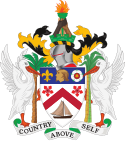Politics of Saint Kitts and Nevis
 |
|---|
|
Administrative divisions (parishes) |
The politics of Saint Kitts and Nevis takes place in the framework of a
General aspects
St Kitts and Nevis has a single
The prime minister in this system is appointed by the governor-general from among the representatives, with the constitutional duty of selecting someone likely to command the support of the majority of representatives. Typically, this means the leader of the majority party or coalition. If no suitable candidate is identified, the governor-general has the authority to dissolve the assembly, triggering a general election. Other ministers are also appointed by the governor-general, based on the advice of the prime minister. The prime minister can be removed from office either by the assembly or by the governor-general if the prime minister loses the support of the majority of representatives. The assembly is elected every five years unless the governor-general dissolves it earlier, which can be done on the advice of the prime minister.
St Kitts and Nevis has enjoyed a long history of free and fair elections, although the outcome of elections in 1993 was strongly protested by the opposition and the
The 2015 Saint Kitts and Nevis general election was won by Timothy Harris and his recently formed People's Labour Party, with backing from the PAM and the Nevis-based Concerned Citizens' Movement under the 'Team Unity' banner.[3] In June 2020, Team Unity coalition of the incumbent government, led by Prime Minister Timothy Harris, won general elections by defeating St Kitts and Nevis Labour Party (SKNLP).[4] In the general election on 5 August 2022, Terrance Drew was elected as the fourth and current prime minister of Saint Kitts and Nevis after his St. Kitts-Nevis Labour Party (SKNLP) won snap general election.[5]
Under the constitution, Nevis has considerable autonomy and has an
Its judicial system is modelled on British practice and procedure and its jurisprudence on English common law. The Royal St Kitts and Nevis Police Force has about 370 members.
Executive branch
As head of state, King Charles III is vice-regally represented by a Governor-General who acts on the advice of the prime minister. Following legislative elections, the leader of the majority party or leader of a majority coalition is usually appointed prime minister by the governor-general. All other ministerial appointments, including that of deputy prime minister, are made by the governor-general, but acting upon the advice of the prime minister.
Political parties and elections
Judicial branch
Eastern Caribbean Supreme Court (based on Saint Lucia); one judge of the Supreme Court resides in Saint Kitts.
The Judicial Committee of the Privy Council in London is the highest appellate court.
Administrative divisions
The country is divided in
International organisation participation
External links
References
- ^ "1983 Saint Kitts and Nevis Constitution". pdba.georgetown.edu.
- ^ "SKNVibes | One Caribbean Community". Archived from the original on June 14, 2006. Retrieved April 3, 2006.
- ^ Team Unity wins St Kitts and Nevis 2015 general election Archived 23 September 2015 at the Wayback Machine Caribbean Elections, 17 February 2015
- ^ Reporter, WIC News (6 June 2020). "Election 2020 - Landslide victory for Team Unity in St Kitts and Nevis". WIC News.
- ^ Salmon, Santana (8 August 2022). "St. Kitts Nevis new PM sworn into office". CNW Network.


